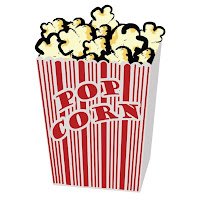“Zoolander,”
a 2001 comedy starring Ben Stiller, is one of those movies that my friends and
I still quote from and laugh about. The soundtrack, however, did not
stick in my memory the way certain lines did. In the book Understanding
Movies, author Louis Giannetti describes how “moviegoers are not usually
consciously aware of how sound affects them, but they are constantly
manipulated by the mixer’s synthesis” (Gianetti p 208). An effective
soundtrack enhances and supplements what is going on visually and through
dialogue. As I looked at “Zoolander” again, this time with a critical eye (and
ear), I noticed the strategic choice of songs.
In
one scene Derek Zoolander’s roommates suggest that an Orange Mocha Frappuccino
would cheer him up. We next see the male model friends driving in an open
Jeep, bopping to the sounds of “Wake Me Up Before You Go-Go” performed by
WHAM!, beverages in-hand, waving to people and laughing. The song is fun
and upbeat and captures the light-hearted mood they are in. You can
imagine they have cranked the song up on the car radio. The song
continues when they pull into a gas station and begin to playfully fling water
at each other using the window washing squeegees. Derek’s attention is
drawn away and he leaves the action. He looks back with fond amusement to
see them now spraying each other with gas from hoses. Suddenly the song
goes into slow motion as Derek notices one of the guys about to light a
cigarette. The next second the car blows up and the song cuts off. “Music
can be used as foreshadowing, especially when the dramatic context doesn’t
permit a director to prepare an audience for an event” (Giannetti p 214). The
lyrics “You take the gray skies out of my way, You make the sun shine brighter
than Doris Day, Turned a bright spark into a flame” (Metro Lyrics) are a subtle
but helpful cue to the audience of the abrupt change from happiness to horror.
That last line comes shortly before the car bursts into flames. I see a
lyrical connection between the lyrics and the whole scene.
In
the book Everything’s an Argument, authors Andrea A. Lunsford and John
J. Ruszkiewicz believe that you can use pathos to create an emotional appeal
that will make the scene stronger and more memorable for the audience. My
emotions were at a high watching these guys have a great time together in the
early part of the scene. The song is very fun and makes you want to join
in the dancing with them. When the music changed my emotional reaction was an
immediate “oh no, what is about to happen?”. Without the music, it would
have been pretty odd to have these guys bopping around in the car and goofing
off at the gas station.
A
song that is used to advance the meaning of a certain scene is “Relax.”
Derek Zoolander has been brainwashed to kill the Prime Minister of
Malaysia and this song is the audible trigger for Derek to strike. Later
on in the movie, as Derek takes to the runway during a fashion show, the song
starts up again and you automatically wonder if he will go through with it.
It is slightly ironic, though, that the lyrics are “relax, don’t do it.”
The
scene in which Derek and Hansel are trying to find files in a computer
exemplifies the points that “music gradually increases in frequency as the
scene moves towards its climax” and “the faster the tempo of sound, the greater
the tension produced in the listener” (Giannetti p 208). Unfortunately,
these two models are not the brightest of the bunch. They think there are
literal file folders trapped inside the machine. The scene begins without
music but then slowly adds it in as they start hitting the computer to get to
the folders. The music gets louder as their intensity grows and their
behavior becomes increasingly ape-like. It seems to me that the song is
there to add drama to the comedy. The logic behind it was to create the
intensity in the scene, to show how this is really a battle of man versus
machine. Those who recognize the song will smile to hear the theme from the
1968 movie “2001: a Space Odyssey” that featured apes, a computer and the topic
of intelligent life. Without the music underscoring their actions, it
would seem a little ridiculous that the scene devotes 47 seconds to their
hitting the computer. The song choice for this scene was spot on. I felt that
the song made the scene very effective.
I
enjoyed going through the “Zoolander” soundtrack. It is fairly upbeat overall,
with many of the songs having a dance feel to them. This was especially
true in runway scenes when models are walking to the beat of the song.
The songs were appropriate and did not detract from the clever dialogue
and acting of Ben Stiller, Will Farrell, and others.
Citation
Giannetti,
Louis D. Understanding Movies 12th edition. NJ: Pearson, 2011. Print.
Lunsford,
Andrea; Ruszkiewicz, John. Everything’s an argument. MA: Bedford,
200





No comments:
Post a Comment